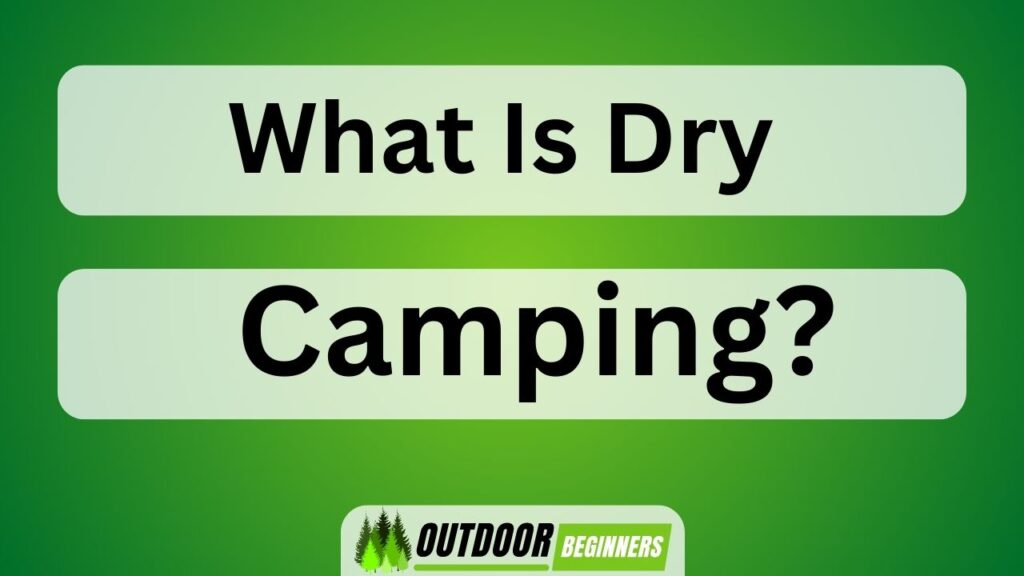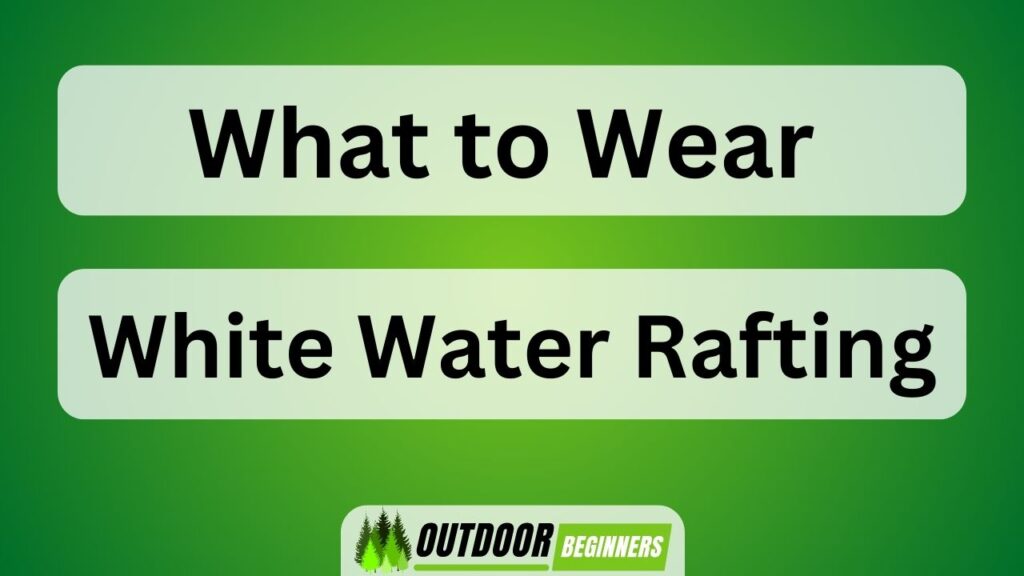So, you think camping is all about plush RVs and cozy campground hook-ups? Well, prepare to have your mind blown.
We’re here to introduce you to the world of dry camping. What’s that, you ask? It’s a whole different ball game – no electrical connections, no water hook-ups. Just you, your gear, and the great outdoors.
In this article, we’ll dive into the basics of dry camping and equip you with all the knowledge and gear you need for this off-grid adventure.
Let’s get started!
Key Takeaways What Is Dry Camping
- Dry camping is camping without electrical hookups or running water.
- Essential gear for dry camping includes a reliable tent, portable stove or grill, cooler or food storage containers, and campfire cooking tools.
- Finding suitable dry camping locations requires effort and research, and can be done through online resources, national forests, experienced campers, and online forums.
- Water and waste management are important while dry camping, and can be achieved through low-flow faucets and showerheads, rainwater collection, biodegradable products, and portable toilets.
The Basics of Dry Camping
Dry camping is a type of camping where campers do not have access to electrical hookups or running water. It is a unique experience that allows us to connect with nature in a more primitive way.
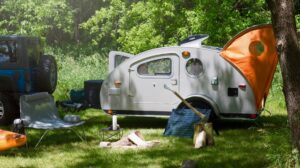
One of the highlights of dry camping is campfire cooking. Without modern appliances, we rely on the open flame to prepare our meals, creating a sense of adventure and nostalgia.
However, dry camping also brings the possibility of wildlife encounters. Being out in nature without the comforts of civilization means we are sharing their territory. From curious raccoons to majestic deer, these encounters remind us of the beauty and wildness of the natural world.
Transitioning into essential gear for dry camping, it’s important to be prepared for both cooking over an open fire and potential wildlife encounters.
Essential Gear for Dry Camping
Make sure you’ve packed all the essential gear for when you’re going off the grid and enjoying nature without any hook-ups. When it comes to dry camping, having the right camping equipment is crucial for a successful trip. Here are four must-have items:
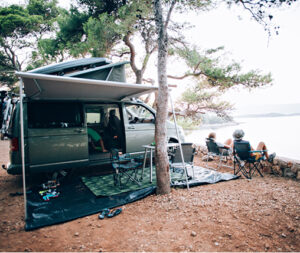
- A reliable tent: Choose a sturdy tent that can withstand various weather conditions. Look for one with good ventilation and easy setup.
- Portable stove or grill: Since there won’t be any hook-ups, you’ll need a way to cook your meals. Invest in a portable stove or grill that is compact and easy to use.
- Cooler or food storage containers: Proper food preparation is important during dry camping. Bring a cooler or food storage containers to keep your perishable items fresh and organized.
- Campfire cooking tools: Enhance your outdoor cooking experience with campfire cooking tools like roasting sticks, grilling baskets, and cast iron pans.
Tips for Finding Dry Camping Locations
When you’re looking for places to go off the grid and enjoy nature without any hook-ups, it’s important to research and find suitable locations.
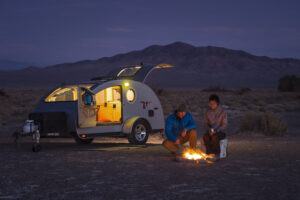
Finding secluded spots for dry camping can be a rewarding experience, but it requires some effort. Firstly, consider using online resources that specialize in listing remote campsites or national forests that allow dispersed camping. These websites often provide detailed information about each location, including amenities and regulations.
Additionally, talking to experienced campers or joining online forums dedicated to dry camping can provide valuable insights and recommendations on hidden gems off the beaten path.
Once you’ve narrowed down potential spots, consider alternative power sources such as solar panels or portable generators to meet your electricity needs while minimizing your impact on the environment.
Water and Waste Management While Dry Camping
To manage your water and waste while off-grid, it’s important to be mindful of your consumption and utilize eco-friendly methods. When dry camping, resources can be limited, so water conservation becomes crucial.
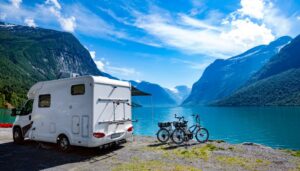
Here are some tips to help you effectively manage your water and waste:
- Install low-flow faucets and showerheads to reduce water usage.
- Collect rainwater in barrels or tanks for non-potable purposes such as washing dishes or flushing toilets.
- Use biodegradable soap and cleaning products to minimize environmental impact.
- Invest in a portable toilet with a waste tank that can be emptied at designated dump stations.
By implementing these practices, you can significantly reduce your ecological footprint while enjoying the freedom of off-grid living.
Remember to always respect nature by leaving no trace behind and practicing responsible waste management.
Safety and Etiquette for Dry Camping
Ensure your safety and maintain proper campground etiquette by always extinguishing fires completely before leaving your campsite. Safety precautions are crucial when it comes to dry camping. Before setting up a campfire, make sure to choose a safe location away from any overhanging branches or flammable materials. Clear the area around the fire pit of any debris that could catch fire easily. When starting a fire, use only designated fire rings or pits and avoid building large bonfires that can quickly get out of control.
Proper campfire etiquette is essential for preserving the beauty of the natural surroundings and ensuring a positive experience for everyone. Keep your fire manageable, as larger fires consume more wood, generate more smoke, and increase the risk of accidents. Remember to never leave your campfire unattended and always have water or a bucket nearby to quickly extinguish it if needed.
Frequently Asked Questions
How Long Can You Typically Dry Camp For?
When dry camping, it’s important to conserve water. Here are some tips: limit showers, reuse dishwater for cleaning, and use disposable plates. To find the best spots, research online forums or ask fellow campers for recommendations.
Are There Any Restrictions on the Type of RV or Camper That Can Be Used for Dry Camping?
When it comes to dry camping, there may be restrictions on the type of RV or camper that can be used. It’s important to check with specific campgrounds or parks for any limitations or requirements.
Is It Safe to Dry Camp Alone?
When dry camping alone, safety precautions are essential. We recommend having a reliable means of communication and letting someone know your location. Additionally, packing emergency supplies like a first aid kit and flashlight is wise. Stay prepared and stay safe!
How Do You Handle Food Storage and Cooking While Dry Camping?
When dry camping, we handle food storage and cooking by carefully planning our meals and bringing non-perishable items. We also use coolers with ice packs for perishable foods. It’s important to have a well-organized system to ensure food safety and minimize waste.
Can You Still Use Electronics and Appliances While Dry Camping?
Yes, we can still use our beloved electronics and appliances while dry camping! With alternative power sources like solar panels or generators, we can stay connected and enjoy modern comforts in the great outdoors.
Conclusion
In conclusion, dry camping is a thrilling and adventurous way to disconnect from the hustle and bustle of everyday life. From understanding the basics of dry camping to acquiring essential gear, we’ve covered it all.
Remember, finding the perfect dry camping location requires some research and patience, but it’s well worth it. Managing water and waste responsibly is crucial for preserving nature’s beauty.
Lastly, always prioritize safety and practice good campground etiquette. So pack your bags, hit the road, and let the world be your oyster!
